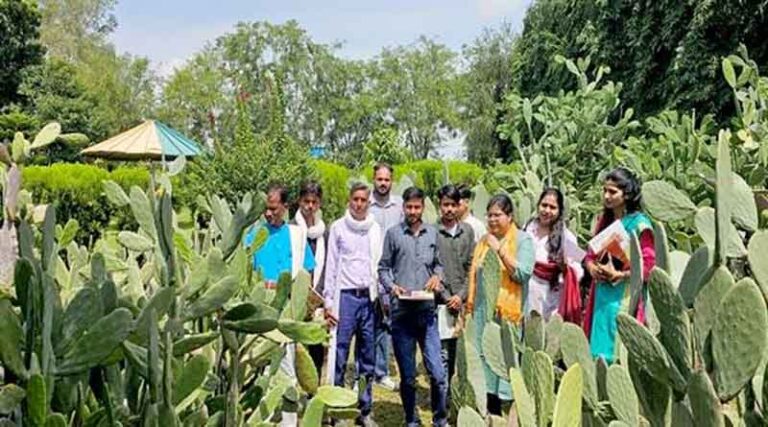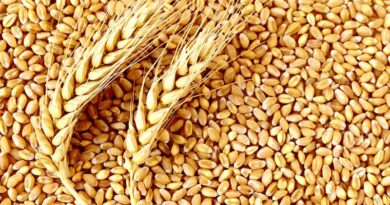
Farmers Learn Spineless Cactus Cultivation – A Sustainable Option for Drought-Prone Regions
09 October 2025, Sheopur: In an effort to promote climate-resilient and sustainable agricultural practices, a group of farmers from Sheopur district of Madhya Pradesh in India visited the ICARDA Centre at Amalaha, Sehore, under the Green-Ag Project implemented by the Department of Farmers’ Welfare and Agriculture Development in collaboration with the Food and Agriculture Organization (FAO).
The visit aimed to introduce farmers to the cultivation and diverse applications of spineless cactus, an innovative crop that offers significant potential for dryland and semi-arid farming systems.
The delegation was accompanied by Dr. Neelam Bisen Pawar, State Technical Coordinator; Mrs. Mili Mishra, Communications Officer; and Amritesh Vashishtha, Livestock Expert.
A Climate-Resilient Crop that Thrives on Minimal Water
During the training, Dr. Neha Tiwari, Scientist at ICARDA–India, explained that cactus is a highly water-efficient crop capable of thriving in arid and degraded lands with minimal rainfall or irrigation.
Its spineless variety makes it particularly suitable as a green fodder alternative for livestock during dry seasons or drought periods when feed resources are scarce.
Dr. Tiwari also demonstrated how spineless cactus can be used to produce biogas and organic manure, adding value to its agricultural and environmental benefits. “The cactus is not just a crop—it’s a climate-smart solution that supports farmers’ livelihoods while conserving resources,” she said.
Farmers Witness the Cultivation Firsthand
The participating farmers had the opportunity to observe various cactus varieties in the field and learn practical techniques related to its planting, maintenance, and utilization.
Many expressed enthusiasm about adopting the crop on their own lands, noting its potential to reduce input costs, ensure green fodder availability, and enhance income stability.
Farmer Ramlal Meena from Sheopur remarked, “Our region often faces water shortages. This crop can help us utilize barren land and secure green fodder for our livestock even during dry months.”
Green-Ag Project: Integrating Sustainability into Indian Farming
The Green-Ag Project, currently being implemented in Sheopur and Morena districts of Madhya Pradesh, focuses on biodiversity conservation, climate adaptation, and sustainable land management.
Through this initiative, farmers are trained in eco-friendly and climate-resilient farming practices, among which spineless cactus cultivation has emerged as a promising model.
The project exemplifies FAO’s vision of integrating nature-based solutions into local agricultural systems to build resilience and reduce vulnerability in the face of climate change.
A Sustainable Path Forward for Arid Regions
As droughts and erratic rainfall increasingly challenge traditional agriculture, crops like the spineless cactus present a viable alternative.
Its low water requirement, multiple end-uses, and adaptability to degraded soils make it an ideal crop for the future of dryland farming in India and similar regions globally.
The Sheopur farmers’ exposure visit underlines how locally adapted innovations can play a transformative role in enhancing rural resilience, ensuring fodder security, and contributing to sustainable agriculture worldwide.
Also Read: The Quiet Power of Biostimulants: Missing Link in Regenerative Agriculture
📢 If You’re in Agriculture, Make Sure the Right People Hear Your Story.
From product launches to strategic announcements, Global Agriculture offers unmatched visibility across international agri-business markets. Connect with us at pr@global-agriculture.com to explore editorial and advertising opportunities that reach the right audience, worldwide.






